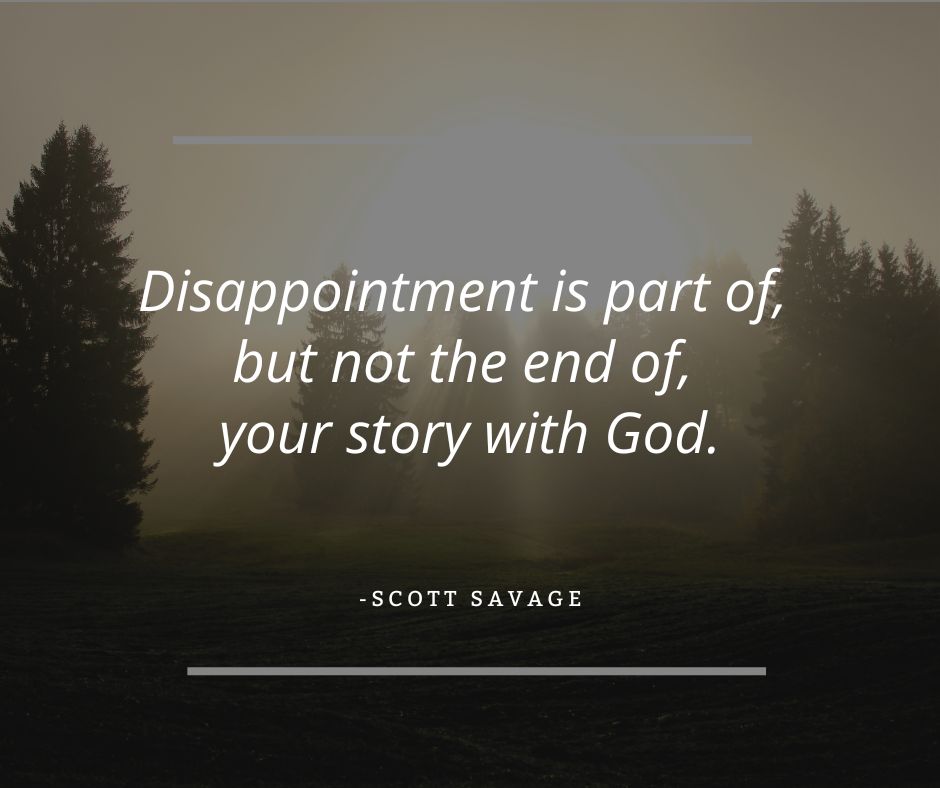Healing From Disappointmentنموونە


If you had to pick a picture to represent your prayers, what image would you choose?
Would you choose a formal dinner where everyone politely asks someone to pass the bread or sticks to superficial small talk?
Would you select a short text message that was quickly typed out and sent over a long distance?
Or would you pick a cage fight, where two people are wrestling with one another until one person surrenders the fight?
As a pastor, I interact with many people who inherited a polite, neat vision of prayer. Their prim and proper prayers function like a formal dinner where everyone dresses up and behaves well. They talk to God in a way they never talk to anyone else.
Other people I meet treat prayer like sending a text message to a friend. When they have a need, they write it as quickly as possible and keep it brief.
Those whose prayer habits have earned my respect and admiration pray as they fight for their lives. They wrestle with God. They've prayed through dark, intense, and difficult seasons. They speak with God honestly and directly. While their prayers might not always be welcome in a church's liturgy, I admire the trust and honesty they feel before God.
What is your prayer life like? Your answer is incredibly important because prayer is one way we navigate disappointment with life and God. Throughout the Bible, we read about men and women who bring their disappointments to God rather than allowing their disappointments to drive a wedge between them and God.
In 1 Samuel 1, Hannah pours out her grief over her barren womb. In Esther 4-5, the Jews come together with prayer and fasting to ask God to spare Esther's life as she seeks to save their people. The desperate, direct prayers that dominate the Psalms might shock you with their intensity. In Psalm 130, pilgrims headed to Jerusalem declared, "From the depths of despair, O Lord, I call for your help." During a class on the spirituality of the Psalms, one of my seminary professors told us that 73 of the 150 chapters are laments. Laments express intense human struggles, such as deep sorrow, grief, and regret.
If you've ever witnessed someone lament, it's nothing like a formal dinner. Prayer in the face of disappointment is often ugly and messy. But, the mess is often necessary if we're going to be honest with God and ourselves. After all, God cannot heal what we do not confess. Like any other healthy relationship, honesty with God is a requirement. After all, God already knows what we're thinking but not saying aloud. Psalm 44 tells us that God knows the secrets of our hearts.
This plan is entitled "Healing from Disappointment." If you're going to heal the wounded areas where disappointment has dominated you, you need to increase your honesty with God. The path from healing to hope runs straight through honesty. The honesty of King David after his sinful spiral with Bathsheba and Uriah led to genuine repentance and restoration of his relationship with God. In that confession, David said, a broken and contrite heart you, God, will not despise."
As this plan concludes, I encourage you to walk outside or get in your car for a long drive. Without anyone around, speak the unsaid words you've been holding onto before God. Say them out loud. Scream, cry, say whatever it takes to be honest before the Lord. Draw near to God, and watch Him draw near to you! Disappointment is part of, but not the end of, your story with God. Hope and healing are available to you.
I pray this plan has helped you take a big step towards hope and healing! Click here for a complimentary copy of my Overcoming Disappointment Action Plan, a super practical tool to help you continue to apply the lessons from this reading plan.
دەربارەی ئەم پلانە

You've been disappointed, and you've disappointed someone else this year. We all experience disappointment, but disappointment doesn't have to define us. In this plan, I'll show you how to face your disappointment and watch God transform it. Healing is possible, and hope can be regained.
More
پلانە پەیوەستەکان

DEPRESSION IS a LIE - a Podcast Series With Dustin Tavella

Center of It All

Endurance: God’s Power for Your Weight Loss Journey

Relentless Love: Reflections on the Book of Jonah

The Gospel According to Mark: Jesus the Suffering Servant

The Wonder of the Wilderness

Journey Through 1 & 2 Peter and Jude

Healing Family Relationships Through Compassion

Dog Dad Devotions on Leadership, Loyalty and Love
